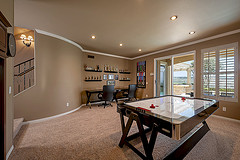Best Uses for Bonus Rooms
 "Bonus room" is a new term in the real estate business, coined in the early 90s. Although debate is still ongoing as to what it actually means, usually the phrase describes an extra space which can't be called a bedroom because it lacks a closet, door, adequate ceiling height, or fire safety features. The "bonus" is that frequently you'll pay a lower amount of property tax on this room. It may be all too tempting to turn a bonus room into a clutter warehouse, but if you go ahead and clear out the junk, you'll be ready to remodel this supplementary space into a functional -- and fun -- living area. To get started, ask yourself these 8 questions.
"Bonus room" is a new term in the real estate business, coined in the early 90s. Although debate is still ongoing as to what it actually means, usually the phrase describes an extra space which can't be called a bedroom because it lacks a closet, door, adequate ceiling height, or fire safety features. The "bonus" is that frequently you'll pay a lower amount of property tax on this room. It may be all too tempting to turn a bonus room into a clutter warehouse, but if you go ahead and clear out the junk, you'll be ready to remodel this supplementary space into a functional -- and fun -- living area. To get started, ask yourself these 8 questions.
1. Have you checked out the legalities?
Whenever you plan to add or remodel a room in your home, find out local requirements regarding building permits and zoning. Don't try to take shortcuts with this step; otherwise, you may have difficulty obtaining homeowners' insurance or reselling your house. And make very, very sure that your plans don't involve cutting through a firewall.
2. Is the roof low or sloped?
A low or sloped roof, as in a basement or attic, means lowered ceiling height. Requirements for minimum ceiling heights may differ according to local building code, and these can vary yet again depending on the intended use of the room. The height specifications for "habitable spaces" like living rooms and bedrooms are generally higher than those for kitchens, bathrooms, and hallways.
3. Do you have (or can you add) egress?
Egress is required for every sleeping room, even if it's only used for that purpose occasionally. If you have an egress window or door (or can easily build one), that bonus room can become a much-needed spare bedroom. Because, by definition, bonus rooms don't usually include a closet, you might want to purchase a European-style wardrobe to hang clothes in.
4. Where is your bonus room located?
Bonus rooms are often built on the bedroom floor at the time a house is constructed. These are generally the easiest and most flexible to use for whatever purpose your family fancies. A bonus room may also be created by remodeling the basement or the space over your garage, or even enclosing a patio. In these cases though you may face problems such as installing plumbing and HVAC, your remodeling contractor can help you find solutions. And one advantage of this kind of bonus room is that zoning ordinances permitting, you may be able to transform it into an income-generating rental unit.
5. Is your extra room naturally bright or dim?
A bright and sunny bonus room is great for detail-oriented hobbies like sewing or crafting, while a darker space would make the perfect home media center, with all the authentic ambiance of a real movie theater.
6. Would you like a flexible-purpose room?
Flex rooms, which serve two or more functions, are gaining in popularity. Plan ahead to make this multitasking room as comfortable and practical as possible. For example, a home office could be discreetly partitioned off at times when the room will be used as a guest bedroom.
7. Are you the proud parent of teens or tweens?
A bonus room is prime real estate as a second family room for your teens or tweens. They can socialize with friends in their own space, and you won't have to chauffeur them back and forth -- or worry about older kids driving home. In addition, this arrangement frees up the living room for your own entertaining.
8. Do you enjoy staycations?
Then turn your bonus room into a center for at-home relaxation. A home spa, workout space, games room, music studio, or cocktail lounge -- let your imagination soar! And if you've ever had a craving to go a little wild with color and decor, this is the ideal spot to try the glitzy gold wallpaper you have your eye on.
Laura Firszt writes for networx.com.
Looking for a Pro? Call us (866) 441-6648

Remodeling Average Costs
Remodeling Contractors Experiences

Deck Repair On A Deadline

Repairing Our Roof Valley Stopped A Leak From Getting Worse



